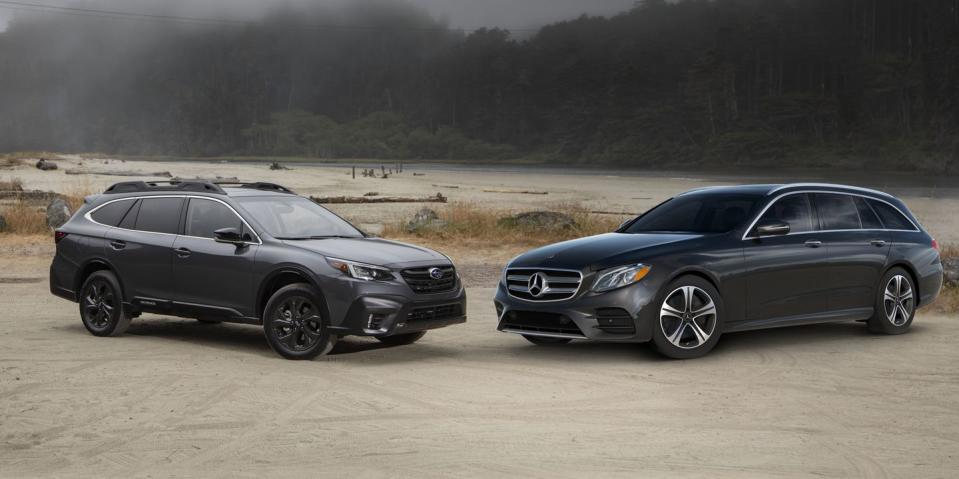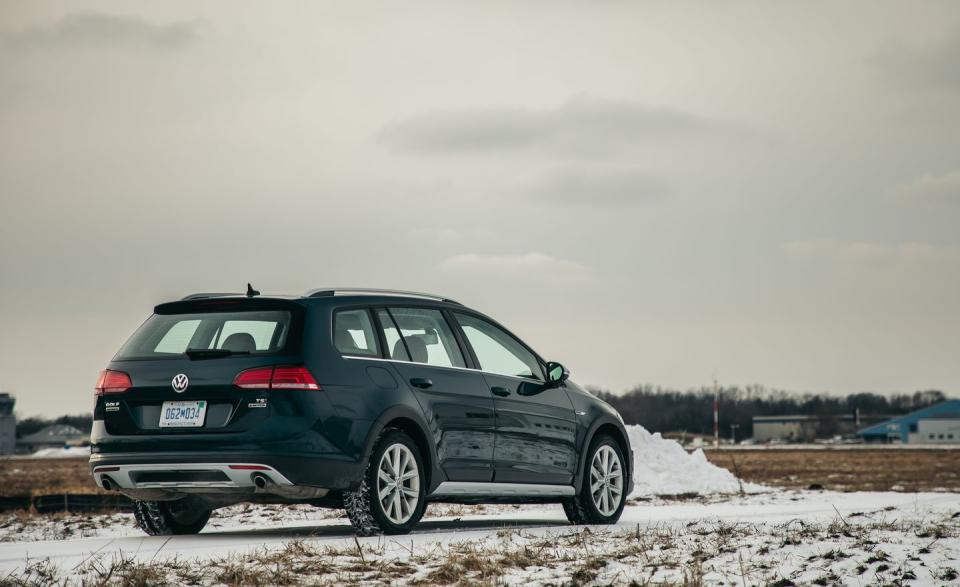Station Wagons Sell in U.S. Mainly When They're Disguised as SUVs

Wagons given a rugged treatment to make them more like SUVs are vastly outselling traditional-looking wagons in the U.S. market.
As two examples, the Subaru Outback (pictured at left above) found 181,178 buyers in the U.S. in 2019, whereas the Mercedes-Benz E-class wagon (right) sold an estimated 8000 units.
Still, brands including Volvo, Audi, and Mercedes make it clear they will continue competing for buyers in the limited wagon market.
We've all heard the common refrain: the station wagon is all but completely dead in America, its place largely taken by crossovers and sport-utility vehicles. And we're not here to tell you otherwise: Jeep, for example, sold more Grand Cherokees alone last year in the United States than all the wagons combined. But if the station wagon does have a future in America, it's to pose as an SUV.
Over the course of 2019, ruggedized wagons outsold "conventional" wagons by a ratio of more than nine to one. Automakers typically differentiate these models by raising their ride height, adding lower-body cladding, and fitting all-wheel drive as standard, all in an effort to increase the wagon's appeal in a market hungry for sport-utes. And in relative terms, at least, it's working.

Last year, Subaru sold over 180,000 Outback wagons in the United States, Volkswagen more than 6200 Golf Alltrack, Buick over 5000 of its Regal TourX, Volvo over 2800 of its V60 and V90 Cross Country models, and Audi some 1300 A4 Allroads.

Meanwhile, Jaguar moved about 200 XF Sportbrake wagons, Volvo fewer than 1400 "standard" V60 and V90 wagons, and Mini 3565 copies of its Clubman. VW did better but still reached sales of fewer than 5000 Golf SportWagens.
A BMW spokesman revealed to Car and Driver that less than 1 percent (or fewer than 500 units) of the 3-series models it sold here last year were Sports Wagon or slant-backed Gran Turismo versions. Mercedes-Benz and Porsche declined to break down their sales by body style, but, based on the industry average, we'd (charitably) estimate that sales of the E-class wagon and Panamera Sport Turismo amounted to little more than 8000 and 1300 units, respectively.
Add up those numbers, and the resulting picture is crystal clear. Of the approximately 216,000 wagons sold in America last year, ruggedized wagons accounted for more than 196,500, or nearly 91 percent of the total. The Outback, which remains Subaru's most popular model in the U.S., accounted for nearly 84 percent of the wagon market all by itself.
With less than 16 percent of that already small market left to be divided up by the other competing automakers, it should come as little surprise that Buick, Volkswagen, and BMW won't be offering their wagons here any longer.
Potentially more surprising is that brands including Volvo, Jaguar, Mercedes, Porsche, and Mini will continue fighting for their slice of that tiny pie. And Audi, whose Allroad wagon (a company spokesperson told C/D) accounted for about 5 percent of overall A4 sales here last year, is bringing two more wagons to the U.S. this year: the performance-focused RS6 Avant and, tellingly, the rugged A6 Allroad. If we were betting types, we know which one we'd wager will sell in greater numbers, however small those numbers may be.
You Might Also Like

 Yahoo News
Yahoo News 